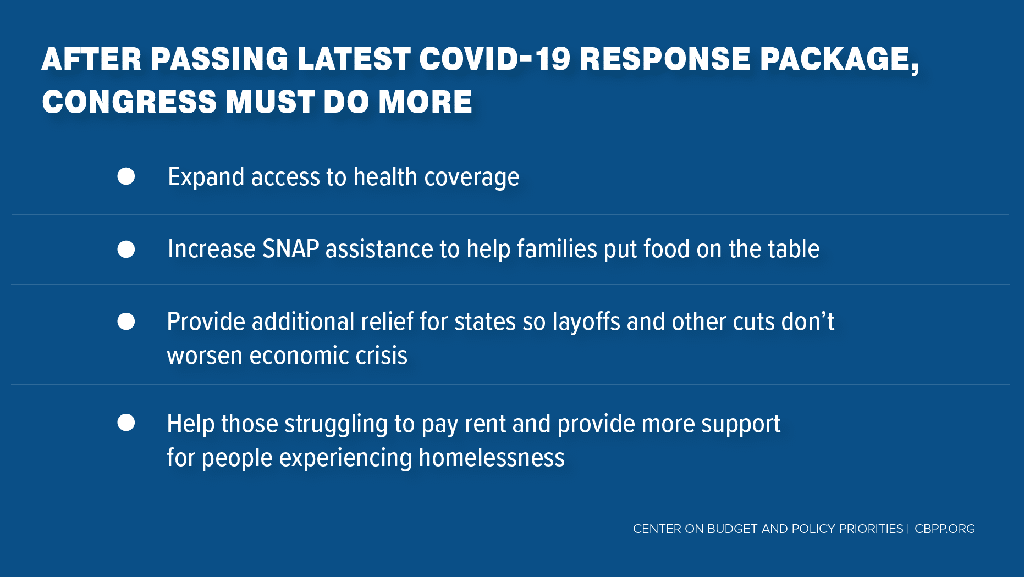This post has been updated since its first publication on March 20 to reflect more recent policy changes.
 These are extraordinary times that require courage, leadership, and collective action from public leaders. The three bills that Congress has passed to respond to the coronavirus and its economic impact are good steps, but do not go far enough.
These are extraordinary times that require courage, leadership, and collective action from public leaders. The three bills that Congress has passed to respond to the coronavirus and its economic impact are good steps, but do not go far enough.
Federal policymakers must enact bold, aggressive, significant additional measures now to mitigate the far-reaching economic harms arising from the COVID-19 pandemic. Those additional measures must include financial relief for states and for people who are struggling to make ends meet.
Fiscal Relief for States
As state revenues shrink during the economic downturn, states will feel pressure to cut health care and other basic services to meet their balanced-budget requirements — and at just the wrong time. Those budget cuts will not only deepen the hardship that many people in need will face, they also will make the economic downturn even worse.
States need substantial fiscal relief to avoid those budget cuts and to cover their higher health care costs — both from COVID-19 and from people enrolling in Medicaid because they’ve lost their job-based health coverage. Pennsylvania will soon feel the one-two punch of the costs of a large-scale public health emergency response effort and deep economic shutdown, and it will need substantial fiscal relief to address the state’s health needs and avoid deep budget cuts.
During the Great Recession of 2008-09, the state fiscal relief provisions of the 2009 Recovery Act played a major role in helping states avert deep budget cuts and address their rising health care needs.
Assistance to Maintain Basic Living Standards
We need to make sure that during this deep economic downturn families can keep food on their tables, purchase diapers, pay rent, and meet other basic needs. As business lay workers off, more people will need to turn to Medicaid, unemployment insurance, SNAP/food stamps, and other forms of public assistance to meet their basic needs.
Direct payments — especially to people with lower incomes — combined with increases to public benefits under Medicaid, SNAP, and other programs will help people get by while also stimulating the economy.
- Increase food assistance and suspend harmful regulations that take away meals from people who are unable to work.
- Pass the PAID Leave Act to provide paid sick days and paid leave for all working families.
- Provide significant investments in child care so that providers and educators continue to receive pay and cover their operational costs, and to make it affordable for families.
- Boost incomes through direct and significant payments to households, especially for individuals and households with low wages or experiencing poverty, including those that do not file a tax return or don’t have a Social Security number.
- Work to prevent housing crises and homelessness by increasing resources for emergency rental assistance and eviction prevention assistance, a national moratorium on evictions and foreclosures, and by increasing resources for homeless shelters and other housing programs.
Proven stimulus and relief measures can keep things from getting worse and put us on the path to a stronger economy once recovery is in sight. Now is the time for a comprehensive response to this crisis that includes help for state governments and people who are facing the greatest health and financial risks.
What You Can Do
We will keep this section updated with ways to take action to address the concerns we outlined above.
STRENGTHEN SNAP/FOOD STAMPS FOR ECONOMIC RELIEF
As of March 20, the Senate is still in session and is negotiating an economic stimulus package that is expected to respond to the economic upheaval that is gripping the country. Included in those conversations among Senate leadership are SNAP and the nutrition programs.
![]() Contact your U.S. Representative and tell him that the next COVID-19 economic recovery bill, which Representatives are working on now, must build on SNAP’s economic stimulus effects and protect vulnerable populations by
Contact your U.S. Representative and tell him that the next COVID-19 economic recovery bill, which Representatives are working on now, must build on SNAP’s economic stimulus effects and protect vulnerable populations by
1. boosting SNAP maximum benefits by 15 percent,
2. increasing the minimum SNAP benefit from $16 to $30,
3. suspending all SNAP administrative rules that would terminate or weaken benefits,
4. suspending the SNAP work requirement for college students, and
5. enabling shopping for groceries with SNAP online, that allows for social distancing, by
- supporting Senator Casey’s new legislation that would encourage grocers to deliver to SNAP recipients and allow them to swipe their electronic benefit transfer cards at the door, as well as provide $500 million for state agencies to reimburse retailers for delivery fees; and
- opening the SNAP online payment pilot program nationwide so retailers can freely implement technology to enable people on food stamps to pay for groceries online.
PAID LEAVE FOR ALL
Right now, women are the majority of those working on the front lines of this crisis — in hospitals, at grocery stores and big retail chains, and as child care providers around the country — yet under the new Families First Coronavirus Response Act, most of them have no guarantee of paid sick days or longer term paid leave to care for family members or recover from illness themselves
![]() Email your representatives in Congress now and demand that the next COVID-19 relief package includes the newly introduced PAID Leave Act and provides emergency paid sick days and paid leave for ALL.
Email your representatives in Congress now and demand that the next COVID-19 relief package includes the newly introduced PAID Leave Act and provides emergency paid sick days and paid leave for ALL.





No comments yet.